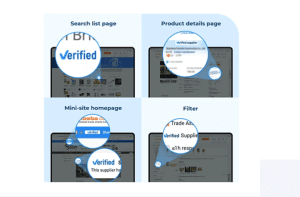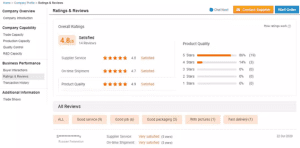Sourcing products from China can be a lucrative venture, offering a wide range of options at competitive prices. However, it comes with its challenges and pitfalls that businesses must be aware of to ensure a successful sourcing experience.
In this blog, I will explore some common pitfalls to avoid when sourcing from China and provide valuable tips to overcome them.
Lack of Proper Supplier Verification:
One of the most critical aspects of successful sourcing is selecting reliable suppliers. Failing to conduct thorough supplier verification can lead to partnerships with untrustworthy or inexperienced suppliers. To avoid this pitfall, implement a robust verification process that includes:
- Checking Supplier Background: Supplier background checking is a vital process in the sourcing journey from China. When you source products from overseas suppliers, you need to ensure that you are partnering with a reliable and reputable company. Supplier background checking involves investigating and learning more about the supplier’s history, track record, and overall business practices.
One of the essential aspects of supplier background checking is to gather information about the supplier’s experience in the industry. You want to work with suppliers who have a proven track record of delivering high-quality products and meeting deadlines consistently. Checking how long the supplier has been in business can give you insights into their stability and reliability.
Customer reviews and feedback play a significant role in the background-checking process. By looking into what other businesses or customers have experienced while working with the supplier, you can get an idea of their reputation and performance. Positive reviews and satisfied customers are indicators of a reliable supplier.
If you are searching on Alibaba, you can check if the supplier is verified or not, navigate to their “Company Profile” page on Alibaba. Look for the “Verified Supplier” mark on this
page, as illustrated below:
For checking feedback and reviews left by previous customers, you need to navigate to the supplier’s minisite on Alibaba. From the supplier minisite, navigate to Company profile> Business performance> Ratings & reviews.
Verifying the supplier’s certifications and qualifications is also crucial. Reputable suppliers should hold necessary certifications and comply with industry standards and regulations. These certifications ensure that their products meet specific quality and safety requirements, which is essential to maintain the integrity of your brand.
- On-Site Visits: Another valuable step in the supplier verification process is conducting on-site visits to the supplier’s facilities, if possible. Visiting their premises gives you firsthand insights into their manufacturing capabilities, production processes, and overall business operations. This personal interaction can help you assess their professionalism and commitment to quality.
- Requesting Samples: When sourcing products from China, it’s essential to request product samples from the suppliers you are considering. These samples allow you to check the quality, and workmanship, and whether they match your requirements.
By performing a comprehensive supplier background check, you can make informed decisions about choosing the right partners for your sourcing needs. Working with reliable suppliers enhances the chances of a successful and smooth sourcing process. It reduces the risks of potential delays, subpar product quality, and other issues that could negatively impact your business.
Ultimately, supplier verification is an essential part of the sourcing process that should not be overlooked. It helps build trust and confidence in your business relationships with Chinese suppliers, leading to fruitful partnerships and successful sourcing endeavors.
Ignoring Intellectual Property Protection:
Intellectual property (IP) protection is crucial when sourcing from China, as it helps safeguard your designs, trademarks, and product innovations from unauthorized use. Neglecting IP protection can lead to counterfeiting and unauthorized production of your products.
To avoid this pitfall, take the following steps:
- Register Trademarks and Patents: Registering trademarks and patents is a crucial step when sourcing products from China. It involves protecting your brand name, logo, and product designs from being copied or used without your permission.
A trademark is a unique sign or symbol that represents your brand. By registering your trademark, you legally establish exclusive rights to use that sign or symbol for your products or services. This prevents others from using a similar mark that may confuse customers or dilute your brand’s identity.
A patent, on the other hand, is a legal right granted to inventors for their unique inventions or designs. When you register a patent, you gain exclusive rights to produce, use, or sell that invention for a certain period. This prevents others from making and selling the same product without your permission.
Registering trademarks and patents in China is essential because it provides legal protection for your intellectual property within the country. Without proper registration, you may face challenges if someone else uses your brand name or copies your product designs, potentially leading to a loss of sales and reputation.
By registering your trademarks and patents in China, you can confidently source products from Chinese suppliers, knowing that your brand and innovations are protected. It also gives you a stronger position to enforce your rights if any infringement occurs, ensuring the long-term success of your business in the global marketplace.
- Non-Disclosure Agreements: Non-Disclosure Agreements (NDAs) are important legal documents used when sourcing products from China. They are designed to protect sensitive information and confidential business details that you share with potential suppliers.
When you want to discuss your product designs, technology, or any other confidential information with a Chinese supplier, you can use an NDA. By signing the NDA, the supplier agrees not to disclose or share confidential information with anyone else. This helps safeguard your intellectual property and trade secrets.
NDAs are essential because they build trust and provide reassurance that your sensitive information will not be misused or shared with competitors. They give you peace of mind when dealing with Chinese suppliers, as you can freely discuss your ideas without fear of someone stealing or using them without your permission.
Using NDAs also demonstrates your commitment to protecting your intellectual property, which can enhance your credibility with suppliers. It shows that you take your business seriously and are proactive in safeguarding your innovations and designs.
Overall, Non-Disclosure Agreements are a valuable tool when sourcing from China. They offer a legal layer of protection for your confidential information, ensuring that your ideas and intellectual property remain secure during the sourcing process.
Poor Product Quality:
Low product quality is a common issue when sourcing from China, and it can lead to unhappy customers, damage your brand reputation, and result in financial losses. To avoid this pitfall, follow these simple steps:
- Request Product Samples: Before making a substantial order from a supplier, always ask for product samples. Product samples give you a firsthand look at the actual items you will be receiving. By inspecting these samples, you can assess the quality, design, and functionality of the products.
Examining product samples allows you to spot any potential issues or defects early on. It helps you to identify if the products meet your expectations and align with your brand’s standards. If you are satisfied with the samples, it gives you confidence in moving forward with the supplier.
- Conduct Quality Inspections: To ensure consistent product quality, consider conducting quality inspections before the products are shipped. Hiring a third-party inspection agency is a practical way to perform these checks. These agencies are independent and specialize in evaluating product quality.
During the inspection process, the agency examines the products based on your predetermined quality criteria. They check for defects, deviations from specifications, and overall workmanship. The inspection report provides valuable insights into the product’s condition and helps you make informed decisions about the shipment.
- Setting Clear Product Specifications: Clearly defining your product specifications is essential to avoid misunderstandings with the supplier. Specify the materials, dimensions, colors, and any other crucial details that affect the product’s quality.
By setting clear product specifications, you provide the supplier with precise instructions, leaving less room for interpretation or errors. This helps the supplier understand your requirements better and ensures that they produce the products to your exact standards.
In short, ensuring these three steps can significantly reduce the risk of encountering poor product quality when sourcing from China. These measures empower you to make informed decisions, maintain quality control, and build a successful and reliable sourcing partnership. Remember, investing time and effort into ensuring product quality is a wise and profitable decision for your business.
You can also partner with sourcing companies like Larkser who are responsible for all the sourcing process and knows how to avoid these pitfalls and can give you the best sourcing experience ever.
Miscommunication and Language Barriers:
When sourcing products from China, miscommunication and language barriers can be challenging to overcome. It happens when there are difficulties in understanding each other’s language or when important information is not conveyed clearly.
Miscommunication can lead to mistakes, delays, and misunderstandings during the sourcing process. For example, if you don’t clearly explain your product specifications or requirements, the supplier may produce something different from what you intended. This can result in receiving products that don’t meet your expectations.
Language barriers can also hinder effective communication with the supplier. If they don’t understand your language well, it becomes challenging to convey your needs and preferences accurately. Similarly, if you don’t understand their language, you may have trouble grasping important details or instructions.
To overcome miscommunication and language barriers, there are some strategies you can use. Firstly, consider working with suppliers who are proficient in English or your native language. This can facilitate smoother communication and reduce the chances of misunderstandings.
Secondly, use simple and clear language when communicating with the supplier. Avoid using jargon or complex terms that might be difficult to translate or understand. Providing visual aids, such as drawings or pictures, can also help convey your requirements effectively.
Lastly, be patient and open to clarifying any misunderstandings. Encourage the supplier to ask questions and seek clarification if they are unsure about your instructions. Similarly, if you don’t understand something, don’t hesitate to ask for further explanation.
By being proactive and mindful of potential miscommunication and language barriers, you can enhance communication with Chinese suppliers and ensure a more successful sourcing process. Good communication is essential to building strong partnerships and achieving the desired product outcomes for your business.
Ignoring Cultural Differences:
Ignoring cultural differences while sourcing from China can lead to misunderstandings and challenges in your business relationships. Cultural differences encompass various aspects, such as communication styles, business practices, and social norms. Overlooking these differences can cause problems and hinder your sourcing efforts.
One key aspect of cultural differences is communication style. Chinese communication may be more indirect or implicit compared to Western cultures. Ignoring this difference may lead to misinterpretations of messages or expectations.
Business practices in China might also differ from what you are accustomed to. For example, Chinese business relationships often emphasize building trust and long-term partnerships before discussing specific deals. If you rush into negotiations without understanding this cultural norm, it may hinder progress and create a negative impression.
Social norms and etiquette are important to consider as well. Greeting customs, gift-giving practices, and appropriate behavior can vary significantly between cultures. Being unaware of these norms may unintentionally offend your Chinese counterparts.
To avoid this pitfall, educate yourself about Chinese culture and business customs. Take the time to learn about their communication style, negotiation preferences, and common business practices. This knowledge will help you adapt your approach and show respect for their cultural norms.
Additionally, building strong relationships is crucial. Invest time in getting to know your Chinese partners, and demonstrate your interest in their culture. This will foster trust and create a positive working environment.
By understanding and respecting cultural differences, you can navigate the sourcing process more smoothly and establish fruitful partnerships with Chinese suppliers. Embracing cultural diversity enriches your business interactions and paves the way for successful sourcing from China.
Conclusion:
Sourcing from China offers numerous opportunities, but it also comes with potential pitfalls that businesses must navigate wisely. By avoiding these common mistakes and implementing proactive strategies, you can ensure a smoother and more successful sourcing experience. Remember to conduct thorough supplier verification, protect your intellectual property, prioritize product quality, enhance communication, and respect cultural differences. By doing so, you can forge strong partnerships with reliable suppliers and source high-quality products for your business’s growth and success.
For comprehensive sourcing support and expertise in quality management, consider partnering with a trusted sourcing company like Larkser. Larkser offers various services, including supplier evaluation, quality control, and supplier development, to help businesses effectively and efficiently source high-quality products from China effectively and efficiently.
 WhatsApp & WeChat: +86 18923760273
WhatsApp & WeChat: +86 18923760273




